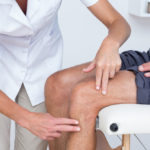“Never Too Late for Fitness (Volume One)” is a collaborative book series featuring leading health and fitness professionals from across the country who are passionate and committed to helping people over 50 get fit, stay fit and live longer, healthier and happier lives.
In this edition, Phil Faris has conversations with the fitness trendsetter, Thomas M. Mitchell, D.C.,CCSP.

Phil Faris: I thought it was interesting that although it was your back that influenced your healthcare journey, many of your Baby Boomer patients don't come to you about back pain. Can you describe some of the most common health issues that cause Baby Boomers to seek you out?
Dr. Mitchell: You're right. I am a chiropractor, so we do back pain, and we do neuromusculoskeletal care, like bones, muscles, and joints, but we also do a lot of functional medicine. I think what people come to me for is to find the answers to the why behind their health issues. Like, "why is this happening?" Then, they want results, like, "how do I get this better?" Not just, "how do I have less pain?" That comes with it sometimes too, but they want to reduce their dependency on medication. They want to live their lives without the encumbrances of what they think aging is.
A perfect example is, I had an 87-year-old man yesterday tell me he now feels like he's 21. Now this gentleman has had colon cancer and prostate cancer; he's had multiple back surgeries, he's had a knee replacement. I mean, he's had a lot of hardship, medically, in his life. He sat in front of me, and the only thing that he feels is a little tingling in his right hand. That's it. Pretty awesome.
Phil Faris: That is impressive for a man of 87 who feels like he’s 21. What are some of the other medical issues people might come to you for that people may not associate with a chiropractor?”
Dr. Mitchell: All kinds of things. From high blood pressure and high cholesterol to weight issues, diabetes. Autoimmune disorders seem to be a big thing in my office right now. We just seem to be getting a lot of patients that we're working with to stabilize their autoimmune disorders by reducing inflammation. The fun thing about what I do is, every person that walks through the door is unique, and you just figure out what's going on with them and you start to apply an approach that allows them to be healthy. We really work on a full gambit of things here.
Phil Faris: One of the things that stuck out from your practice is your use of progressive objective tests. Could share why testing is so important to you and your patients?
Dr. Mitchell: Honestly, Phil, it allows me to hold patients accountable for the things that we need them to do, but it also allows them to hold me accountable for the things that I'm asking them to do. We have something called a bio-impedance analysis in our office. It's a very easy, clinically accurate, clinically relevant test that looks at body composition, so it measures body fat, lean tissue, intracellular water, extracellular water. It gives us all kinds of great information that we can use with a patient, and it’s quick and easy to get. If we have somebody working a program that's structured for them, then that objective data allows us to, again, hold each other accountable and change gears when something's not working. Additionally, we run a lot of blood work and hormone panels, whatever's necessary to look at to get that person better.
The unique part of what I do, because the tests aren't necessarily unique, is our approach. We try to stem off diseases, as opposed to going, "okay, you're okay, you're okay, you're okay, and now you have this disease." You can see that transition in the objective data far before you can see it in an exam. We can see things heading in the wrong direction and stop them before they get too far, which is not how the allopathic model works, or the typical general practitioner works. Typically, theirs must be this black-and-white number where you're diseased, or you're not diseased when there's all that wiggle room in there, and that's where we shine.






Join the conversation